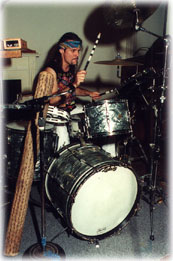
Noisy Toys interviews:
Christo Pellani: professional drummer
 |
Christo Pellani has been playing drums for 30 years and hand-drums for the past 10 years. He performed with his world music group Soundscape Pyramids at the Noisy Toys Holiday Drum Circle in December 1996 and is back with a brand new act. It’s a “Sound-formation” workshop featuring exotic and unusual percussion instruments from around the world. |
NT: Why did you choose the drums to play as a child?
Christo: When I was a kid I carved my first drum sticks out of tree branches and I started messing around with coffee cans like most kids do. I got my first drum kit when I was 12. In the past five years I’ve been playing hand-drums more extensively. I’ve expanded from playing congas to djembe and various Middle Eastern -type instruments like doumbecs and darbukas, tabla and Udu and all the other hand instruments as well.
NT: Tell us about your drum set career and where you’ve played.
Christo: I played on the East Coast for a long time. I did a lot of recording with many bands there and I started touring in the Midwest with a band called Sheriff, which ended up having a hit... after I left, of course. I also did some TV work with Pierre Beauregard’s Cambridge Harmonica Orchestra in Boston. I did a lot of club playing and touring, including a short tour with Mary Wells and the Shirelles. I also played with the Marvelettes and with a band in Washington D.C. called The Dinettes. We used to revive all the old “girl group” tunes with a new-wave kind of beat. We became popular and ended up going on tour with some of those girl group bands.
Since I’ve been on the West Coast I’ve been playing with various people...
everyone from Wade Preston and Planet Ten to the Gila Monsters and the Twilight Lords. I also did a world tour with Air Supply. These days I’m working on my own project called Soundscape Pyramids, which incorporates both drumming and hand drumming in various world music and ambient textures. I’m also working with dance teachers and I’m teaching rhythm awareness in the schools and doing drum circles. I have a sound healing practice and a private drum instruction practice. I’m also working on 3 records, including one on Windham Hill with The Angels of Venice, which is a Celtic- Medieval-Renaissance type of band.
NT: Why are you moving from drum set to hand drums and is it a trend?
Christo: I think a lot of drummers are waking up to the sound and the possibilities of the creative textures with various hand drums. I’ve found it opens up so many more ideas for rhythms and dynamics and creativity with all the different drums from around the world. They all have their own particular sound and technique which is challenging to learn and once you learn it you can create your own ideas for rhythm.
A lot of drummers are either drummers or percussionists, but I’m someone who
does everything and I really like the creative possibilities of that . A lot of drummers are starting to get involved in hand drumming. For me there’s also a spiritual connection.
I love my hand hitting something natural. I love the organic-ness of it and I also finds it
helps improve my dynamics, my sense of time and my creativity when I do play set drums.
NT: Why do you think kids should be exposed to music and drumming?
Christo: I’ve been interested in music therapy and expressive therapy for many years. Before I moved to California I had to make a decision to not go to grad school for expressive therapy because I decided to pursue my performance career instead. I’ve found music has many ways to help people express themselves. I’ve been working with a young man for about 3 years who has Downes Syndrome. He’s a student of mine who instead of working on reading we work on total expressiveness. It is amazing to watch him because he’s so unfettered and inspirational. So “in-the-moment” and expressive.
In doing rhythm awareness in the schools I notice that the children are open to new ideas and are hungry for creativity. There’s also a connectedness they have from listening to each other and it teaches them to be more cooperative and tolerant with each other. It’s a wonderful feeling to see a circle going and to see the looks on the kids’ faces. So I think it’s very important on a lot of levels and I want to do more teaching in schools about world music and music expression.
The Soundscape Pyramids CD and the new
Hands Onsemble CD are available at Noisy Toys.
<- index of interviews

[ home ]